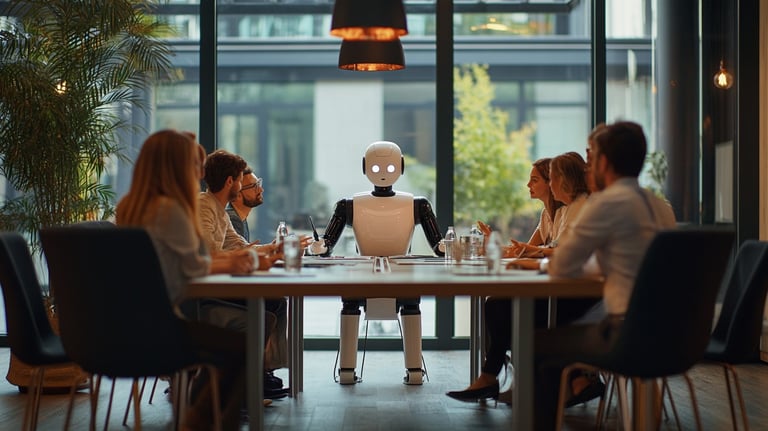Can AI Help Humanity Achieve Sustainable Peace?
In a world where conflicts are fueled by human biases, political agendas, and deep-seated divisions, could artificial intelligence (AI) offer a breakthrough for lasting peace? This thought-provoking article explores the transformative potential of AI in mediation, negotiation, and conflict resolution, drawing on insights from Simon Horton, a conflict resolution expert featured on the London Futurists podcast.
AI FOR SOCIAL GOOD
Makram Soua
8/16/20252 min read


In a world where armed conflicts often seem intractable—fueled by human biases, political ambitions, and the dehumanization of the "other"—could artificial intelligence (AI) offer a way to transcend these limitations and pave the path to lasting peace?
This provocative question was at the heart of a recent London Futurists podcast featuring Simon Horton, a conflict resolution expert. Horton argues that AI, when used thoughtfully, could revolutionize mediation, negotiation, and conflict prevention.
Organizations like Frontline Associates are already pioneering this vision, leveraging technology to facilitate resolution in high-stakes environments. The podcast’s insights underscore the relevance of their mission—and the broader potential for AI to redefine peace-building.
Why AI Could Be a Game-Changer for Peace?
Human mediators bring irreplaceable empathy, cultural nuance, and moral judgment to the table. Yet, they are often constrained by cognitive biases, limited capacity to process vast amounts of data, and the pressure of short-term political gains. History is rife with examples of well-intentioned leaders prioritizing immediate interests over sustainable solutions.
This is where AI steps in—not as a replacement for human judgment, but as a neutral, data-driven complement. Horton highlights several ways AI could transform peace-building:
Uncovering Shared Interests: By analyzing news, social media, and historical records, AI can identify overlooked common ground between conflicting parties.
Neutralizing Biases: AI can facilitate impartial mediation by reducing language barriers and offering solutions free from human self-interest.
Countering Hate Speech and Propaganda: Machine learning can detect patterns in divisive rhetoric, enabling preemptive counter-narratives.
Combating Misinformation: From deepfake detection to real-time fact-checking, AI can mitigate the spread of falsehoods that fuel conflict.
Enhancing Decision-Making: By modeling long-term consequences, AI can help negotiators move beyond emotionally driven stalemates.
Simulating Scenarios: Policymakers can test interventions in virtual environments before implementing them in the real world.
As Horton emphasizes, the goal isn’t to outsource peace to machines—it’s to use AI to amplify human potential. By handling data-heavy tasks, AI frees peace-builders to focus on what they do best: fostering trust, crafting creative solutions, and navigating the human dimensions of conflict.
A Call to Action
The conversation around AI and peace is no longer theoretical. It’s a call to action for policymakers, technologists, and peace-builders to collaborate, innovate, and ensure these tools are deployed ethically and effectively.
The future of peace may depend on our ability to merge the best of human intuition with the power of artificial intelligence. As Horton’s insights reveal, the time to act is now.
𝘛𝘩𝘪𝘴 𝘱𝘰𝘴𝘵 𝘸𝘢𝘴 𝘥𝘳𝘢𝘧𝘵𝘦𝘥 𝘸𝘪𝘵𝘩 𝘈𝘐 𝘤𝘰𝘭𝘭𝘢𝘣𝘰𝘳𝘢𝘵𝘪𝘰𝘯.


